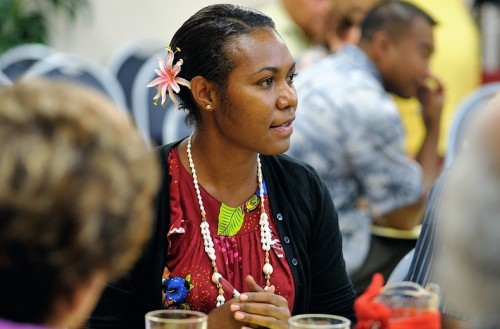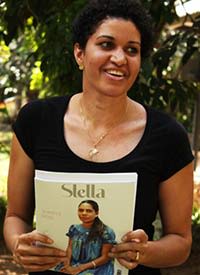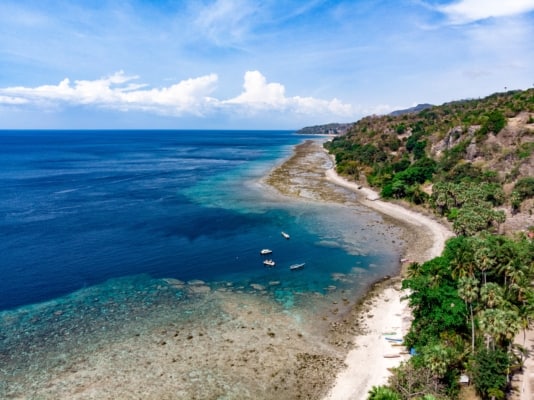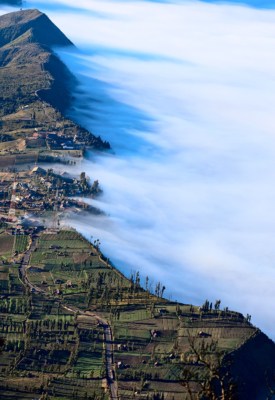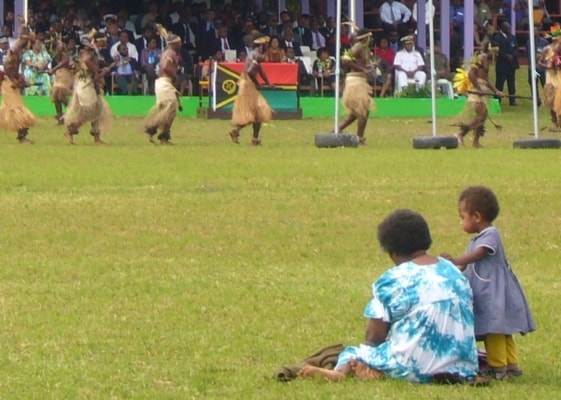Image: Future Leaders of the Pacific Conference, 2013 (US Embassy New Zealand).
Stella, a glossy women’s magazine, is not at first glance an obvious driver of change or a focus for emerging women’s leadership.
Issue of Stella.
It carries the beauty features, high fashion photography plates and cosmetics adverts that its format implies. Yet the magazine’s target readers instantly ‘get’ Stella’s potential to break new ground for women in the Pacific Island communities.
‘Been wanting a woman’s Pasifika magazine for soooo long!’, was one enthusiastic reader’s response to its launch. Her use of textspeak suggests that she belongs to the magazine’s core target age group, women in their mid- to late-twenties. This reader makes it clear that she is hungry for the new, specifically Pacific femininity that Stella, not yet two years old, is trying to deliver.
‘People don’t really consider the female much in our culture’, says Stella’s founding editor Amanda Donigi.
‘We have a particular role in society and we’re supposed to fill it. So what we’re … doing is breaking those stereotypes. There’s lots of amazing stuff that women are doing across our region and they’re not getting the recognition for it from within.’
Stella carries articles about women pilots, lawyers and entrepreneurs – and all of these women are from the Pacific Islands. Not Australian, not American, not European.
Describing itself as a magazine for the region’s thinking women, Stella promotes their leadership qualities and challenges conventional gender norms, contributing to the advancement of a pan-Pacific community of emerging female leaders hitherto ignored by the media. Ironically, of course, many such women have left the Pacific Islands, pursuing educational and work opportunities elsewhere.
And yet, even in exile, the majority of them contribute to the development of their nations.
This has been the case for 30-year-old Elizabeth, who grew up in a home short of money in Port Moresby, Papua New Guinea (PNG). She gained a scholarship to attend a girls’ secondary school in New Zealand and completed a double degree at an Australian university on an Australian aid program scholarship.
One of the conditions of the scholarships sponsored by the Australian government is that graduates must return to their country of origin for at least two years. Elizabeth struggled with the return and eventually gained permanent residency in Australia, where she now works as a senior researcher.
For some, Elizabeth’s journey represents the phenomenon of ‘brain drain’, the loss of the best and brightest from the developing world to wealthier industrial nations. She herself feels guilty about her choice to settle outside PNG. Yet it is clear that Elizabeth’s education benefits other Papua New Guineans.
Not perhaps in the way suggested by recent DLP research into the education of developmental leaders in Ghana. That study showed how quality secondary and tertiary education was crucial for the creation, in-country, of a political elite with shared developmental values. Elizabeth and other educated women like her from the Pacific region have instead to grapple with a large gender gap that continues to restrict their overt access to political or developmental influence in their own countries.
Much of Elizabeth’s relatively healthy Australian income goes back to PNG, helping to educate her nieces and nephews. She also pays for her family’s food and helps her single mother to contribute to important feasts and ceremonies that keep her family connected to its community.
Amanda Donigi, Editor of Stella.
The anecdotal evidence suggests that it is these internationally connected and educated women who are becoming the movers and shakers of the Pacific region. Stella magazine speaks to, and about, a group of educated women who are changing the way ‘development’ is done.
I’ve had the pleasure of interviewing some of these regional change-makers during my research in PNG. These inspirational young women have started anti-violence campaigns, and programs to include young people in discussions about HIV/AIDS. Another established a kindergarten, using her own money to pay the teacher.
Their willingness to commit time, energy and financial resources to their people – in some cases from a distance – suggests the need to rethink leadership as something that must necessarily take place ‘in country’.
If the women I’ve met are anything to go by, it may be more productive to embrace rather than limit their mobility to promote development now and in the future.

